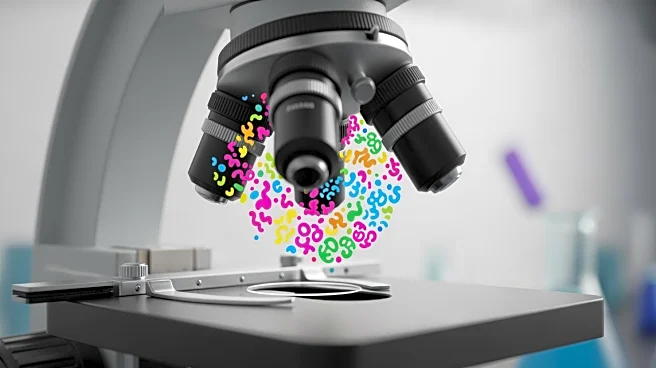What's Happening?
Researchers at the University of Tokyo have employed a Bayesian neural network, a form of artificial intelligence, to study the complex interactions of gut bacteria. This innovative approach aims to uncover connections between bacterial species and human
metabolites that traditional data analysis methods often miss. The human body contains more bacterial cells than human cells, with the intestines alone harboring about 100 trillion bacterial cells. These microbes play crucial roles in digestion, immunity, and brain function by producing and modifying metabolites, which act as chemical messengers. The research team, led by Project Researcher Tung Dang, seeks to map these bacteria-chemical relationships to potentially develop personalized treatments. Their AI system, VBayesMM, uses a Bayesian approach to detect significant bacterial influences on metabolites and measures uncertainty in predictions, outperforming existing methods in studies related to sleep disorders, obesity, and cancer.
Why It's Important?
The application of AI in understanding gut microbiome interactions holds significant potential for advancing personalized medicine. By accurately mapping the relationships between bacteria and human metabolites, researchers could develop targeted therapies to modify these metabolites, offering new ways to treat diseases. This could lead to personalized treatments that harness specific bacteria to produce beneficial metabolites, improving overall health outcomes. The ability to identify meaningful patterns in complex microbiome data could revolutionize how diseases are treated, moving from generalized approaches to more individualized interventions. As AI continues to evolve, its role in healthcare could expand, offering more precise and effective solutions for managing health conditions.
What's Next?
The research team plans to work with more comprehensive chemical datasets to capture the full range of bacterial products, despite challenges in determining the origin of these chemicals. They aim to enhance VBayesMM's robustness in analyzing diverse patient populations and incorporate bacterial 'family tree' relationships for better predictions. Additionally, efforts will focus on reducing computational time for analysis, making the system more efficient. The ultimate goal is to identify specific bacterial targets for treatments or dietary interventions, transitioning from basic research to practical medical applications. As processing power improves, the computational demands of analyzing large microbiome datasets are expected to decrease, facilitating further advancements in this field.
Beyond the Headlines
The ethical implications of using AI in microbiome research include considerations of data privacy and the potential for personalized medicine to exacerbate health disparities. As AI systems become more integrated into healthcare, ensuring equitable access to these technologies will be crucial. Additionally, the legal framework surrounding AI-driven medical interventions will need to evolve to address issues of accountability and patient consent. The cultural impact of personalized medicine could shift societal perceptions of health and wellness, emphasizing individualized care over traditional methods.
















